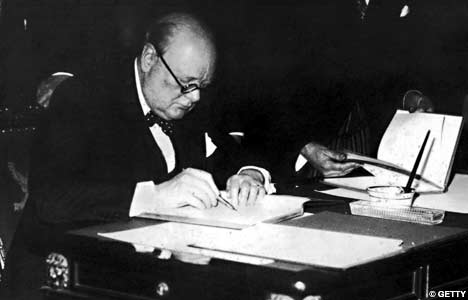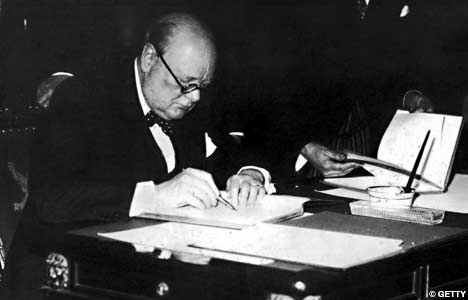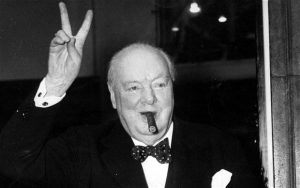
Bulletin #49 - Jul 2012
Mr Churchill’s Profession: Statesman, Orator, Writer, By Peter Clarke

July 10, 2012
The writing aventures of an author who saved the western world.
By Paul Addison
Mr Churchill’s Profession: Statesman, Orator, Writer
By Peter Clarke (Bloomsbury 347pp £20)
LITERARY REVIEW—Churchill the statesman had a lifelong ally in Churchill the writer. The statesman won office and power but a ministerial salary never covered more than a fraction of the costs of a Churchillian lifestyle. It was the huge sums he commanded as a journalist and author that enabled him to enter the House of Commons and support a wife, family and substantial household, not to mention magnums of champagne. But his writings were also an integral part of his politics – advertising his name, vindicating his record, and publicising his ideas. Winston Churchill at work
Winston Churchill at work
In his book In Command of History (2004), David Reynolds revealed the inside story of the writing of Churchill’s war memoirs. The discovery that much of the text was ghost written or economical with the truth had curiously little effect on his reputation: myth-making, perhaps, counted as one of his claims to fame. The centrepiece of Mr Churchill’s Profession is a parallel study of the last of his major works, A History of the English-Speaking Peoples. First published in four volumes in 1956-8, its reception at the time was flattering to the point of sycophancy. Nowadays it is little read and generally regarded as inferior Churchill – the history obsolete, the style more fake reproduction than original. While less dismissive of the merits of the book, Peter Clarke is more impressed by the fact that it was ever written at all. When Julian Huxley took Churchill to see the giant panda at London Zoo in 1939, Churchill gazed at it for a while and remarked: ‘It exceeded all my expectations.’ In Mr Churchill’s Profession, Churchill is the giant panda and Clarke the astonished observer.

2024 International Churchill Conference
Clarke gives us the fullest account yet of Churchill’s hair-raising attitude towards money. He estimates that in the 1930s Churchill’s earnings from a variety of literary activities, journalism included, were the equivalent in today’s terms of around £600,000 a year. But as he writes: ‘Churchill’s system depended on mortgaging the future to provide cash flow in the present.’ With the help of accountants and legal advisers, Churchill did his best to avoid income tax, but deficit finance was his default position. The huge advances he obtained from publishers were frittered away in the belief that he could always raise more if and when the money ran out, which it invariably did. In 1937 he was compelled to put Chartwell on the market, only to be rescued at the last minute by a wealthy financier who took over his debts.
Churchill lost a small fortune in the Wall Street Crash of 1929. But there was money to be made by writing for the American as well as the British market. Hence the idea of a history of the ‘English-speaking peoples’, for which he signed a lucrative contract with Cassell in 1933. The final deadline for delivery was 1939. Having taken on many other money-spinning projects, he was slow to get going and left himself precious little time to complete the book. But once engaged on the task he became an enthusiastic student of Roman, Anglo-Saxon and medieval history, mugging it up at Chartwell and dictating the text night after night into the small hours. With the help of the young Bill Deakin he also sought the advice of professional historians and often accepted their corrections. He seems to have been in awe of G M Young, who addressed him like a tutor ticking off a first-year student: ‘Really, you are flogging a dead horse here.’ But no one could persuade him to part with much-loved old chestnuts like the story of Alfred and the cakes. His verdict on the Arthurian legend was definitive: ‘It is all true, or ought to be.’
Determined to avoid the financial penalty involved in missing the deadline, Churchill worked steadily on through the diplomatic crises of 1938-9. Returning to office at the outbreak of war, he snatched time off from the Admiralty to finish the book, but the text he delivered was incomplete and much of it scissors and paste. When Cassell rejected it and demanded their money back, Brendan Bracken had to be called in to renegotiate the deal. But rescue was at hand. The war turned Churchill into a legend and the book into a potential gold mine. Churchill, however, put it aside again to concentrate on his war memoirs and by the time they were finished he was too old and tired to complete the task. In 1953 the job was entrusted to Alan Hodge, the editor of History Today, who recruited a team of leading historians to assist him: A R Myers, A L Rowse, Joel Hurstfield, Asa Briggs and J H Plumb. Exactly who wrote what remains a mystery, but it seems clear that much of the third and most of the fourth volume were ghosted. Here is a sub-plot of fascination to academics: the co-opting of historians into a Churchillian myth.
In an excursion into the history of ideas, Clarke explains that Churchill’s conception of the English-speaking peoples was cultural rather than racist, and the idea itself a radical populist invention of the 1870s, the decade of Churchill’s birth. Grounded in the belief that the British and American peoples were joint heirs and custodians of the growth of liberty, it was a radical version of Whig history somewhat at odds with the reactionary views on India that Churchill was expressing at the time. For Churchill, the subtext in 1932 was his continuing crusade against the Bolsheviks. But his use of the concept was opportunist. In spite of the fact that his mother was American, it was a theme to which he had rarely attached importance in the past. In the 1920s he was hostile to the United States as an imperial rival. With the rise of Nazi Germany, the common purpose of the English-speaking peoples proved to be a timely theme that, as Clarke points out, entered into the rhetoric of ‘the special relationship’ both during and after the war. We are left wondering whether Churchill was manipulating a myth, or the myth was manipulating him.
Clarke’s book is a scholarly gem: polished and sparkling and a lasting contribution to our understanding of Churchill. As literary biography, which the title seems to promise, it is more limited. This is partly because Churchill’s many other works are only sketched in comparatively brief outline, and partly because the History itself was untypical of his output. Churchill had a passion for military history. With the exception of Lord Randolph Churchill, his most important books featured battles and campaigns recounted in great detail, profusely illustrated with maps, and based on original documents. This is not Clarke’s territory. A historian of ideas and personalities, with a strong affinity for the Liberal tradition in British politics, he gives us Churchill the Whig historian and literary buccaneer. But this is a criticism of his title rather than his book. Perhaps the most significant conclusion to be drawn from it is that in politics, as in finance, Churchill was a gambler. As Enoch Powell said of him: ‘In the great lottery of life, he never rose from the gaming table.’
Read the entire review at Literary Review
©Literary Review. All rights reserved.
Paul Addison’s latest book, No Turning Book: The Peacetime Revolutions of Post-War Britain, is published by Oxford University Press.
Subscribe
WANT MORE?
Get the Churchill Bulletin delivered to your inbox once a month.



